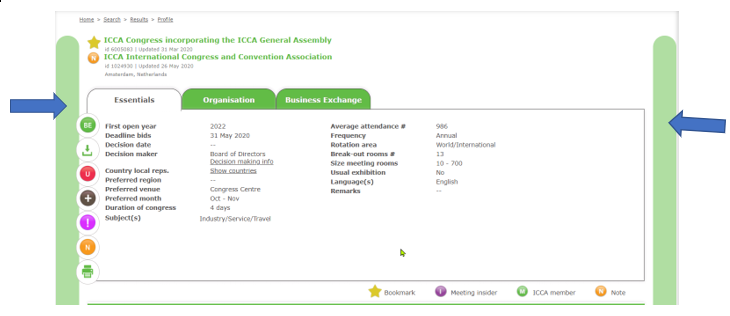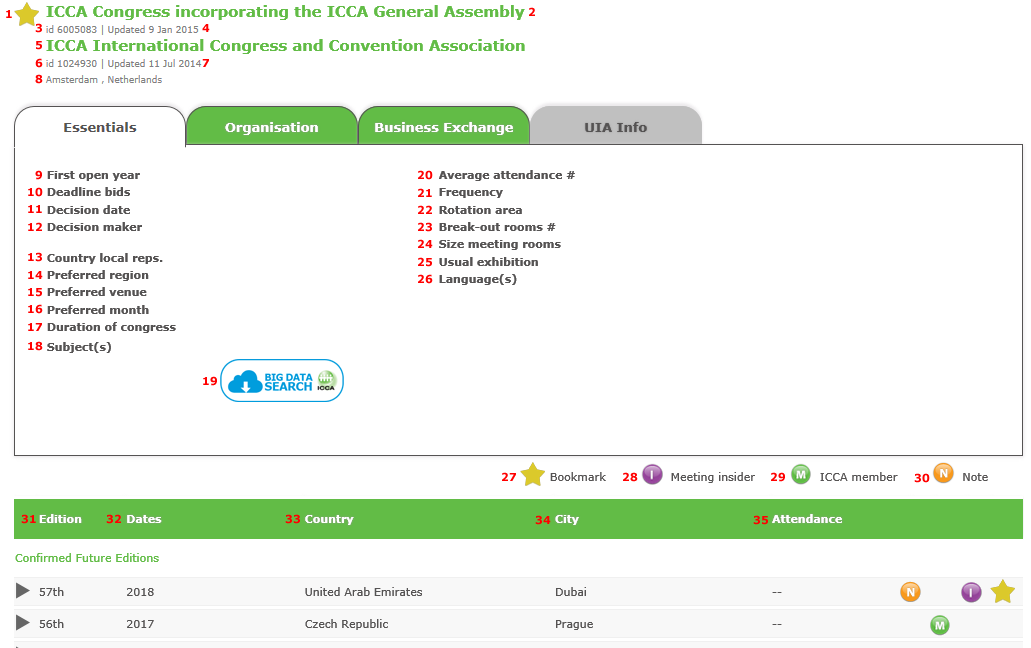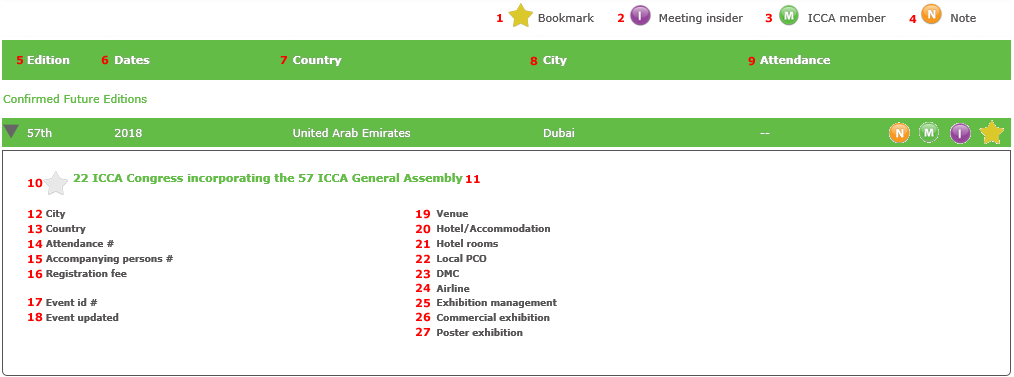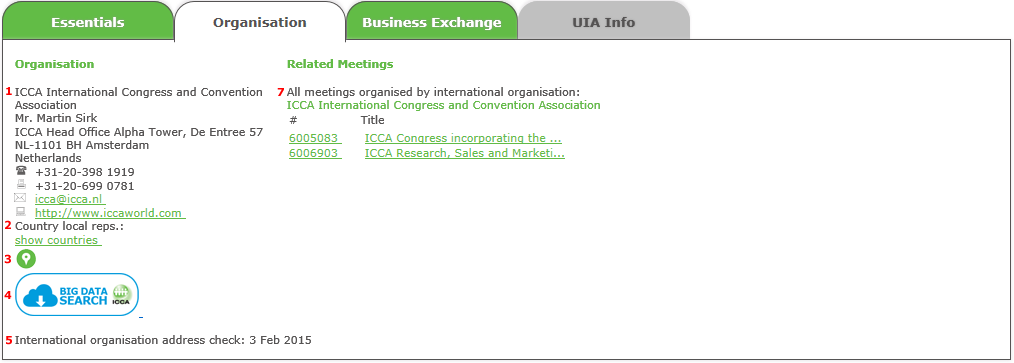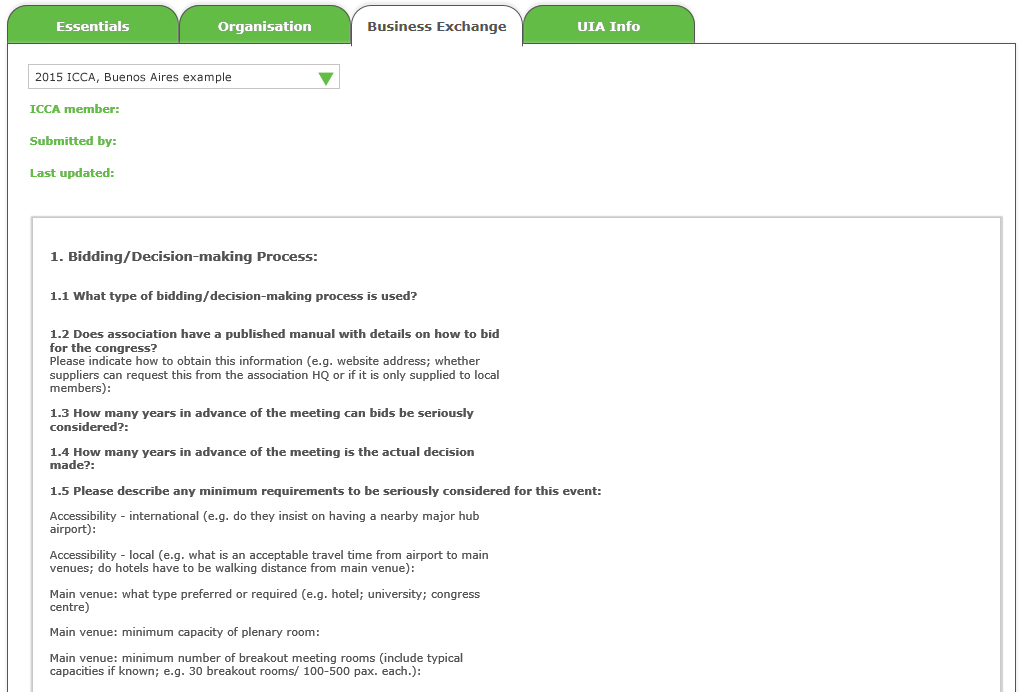Meeting profiles
The ICCA research department has assembled an historical overview of thousands of meetings since 1972. The profiles page provides detailed information about a particular meeting and the organisation. The page consists of three main sections: top navigation, shortcuts (left navigation) and the profile.
Top navigation
The following options are available:
- Manual: Opens the user manual /Knowledge base.
- Close: User logs out of the My ICCA section.
- Home: links to the main screen, called: Dashboard.
- New search: Search for keyword(s), potential meetings, confirmed meetings and organisations.
- Saved selection: Giving an overview of the selection(s) saved by the user. The saved selections can be viewed, deleted and edited by adjusting search criteria.
- Big Data: Opens the Big Data search Dashboard, to search for potential local ambassadors and explore popular industry topics in your destination.
- Bookmarks: Mark a (meeting) profile for easy reference.
- Notes: An overview of all notes added to the meeting profiles.
- RFPs: In this section you will have the opportunity to find information on weekly added profiles containing information on: First open year, Deadline for bids and the Decision making document is available. Note that you could combine these hot leads with your own selection criteria or apply filters to the results list.
- New meeting: here you can add information on an association meeting that meets all our criteria (please add proof) but which is not yet in our database.
- Business Exchange: A listing of profiles, containing additional information submitted by members for Business Exchange sessions. Conditions apply.
Note that the green side bars/buttons added to the left and the right of the profile allow you to browse through the profiles from your result list.
Left navigation
In the meeting profile as well as in the specific meeting editions, a menu appears with the following functionality:
- BE: Opens the Business Exchange tab.
- Export/download profiles.
- Send an update of the meeting to ICCA.
- Add a missing meeting edition to this existing meeting profile
- Reconsider this meeting: if you feel this meeting should not be in the database (because it is corporate, governmental, or the organisation is not trustworthy), then please report it to us via this button.
- Add your personal notes.
- Print or create a pdf of the profile(s).
Tab: Essentials
The profile contains the general name of the meeting (also called: 'Series title') and the organisation. The Essentials tab is opened by default.
Explanation of fields:
- Bookmark: allows you to mark a meeting for easy reference. A meeting bookmarked will have a yellow Bookmark star.
- General name of the meeting (also called: 'Series title').
- id: ICCA's unique number for a general meeting (also called: 'scode').
- Updated: date when the general meeting was updated.
- Name of the organisation.
- id: ICCA's unique number for an organisation (also called: 'icode').
- Updated: date when the organisation profile was updated.
- City and country where the organisation is based.
- First open year: the first year of which destination is not yet known.
- Deadline bids: date on which all bids for this open year have to be received by the international organisation.
- Decision date: date upon which will be decided where the congress will go to
- Decision maker: who will make the final decision
Decision making info: When available, we put in a link to the webpage of the international organisation where they mention who decides where the next event will be held, plus possible additional information for potential hosts. - Country local reps.: this link will open a list of all the countries in which the international organisation has a member. If you click in the list on a country you will open the webpage with names and contact details of those members.
- Preferred region: region of the world where the international organisation would like to hold that congress.
- Preferred venue: the type of venue the int. org. prefers to hold its congress in.
- Preferred month: the month in which the international organisation usually has its congress.
- Duration of congress: how many days the congress takes on average.
- Subject(s): subject(s) or type of industry - field of the congress.
- Big Data Search: Opens the Big Data search application to search for potential local meeting ambassadors/contacts. Based on the subject of the meeting and the location of where the member is based, the Big Data search application will search for organisations (eg universities, hospitals, etc) and meeting contacts (doctors, professors, etc.) based in the city/region of a location specified. Big Data will search in Google Scholar as well as in Microsoft Academics to see which local contacts could potentially help you to invite the organisation to organise the meeting in your destination.
- Average attendance #: The calculation of the average attendance is based on a formula which gives “weight” to recent meeting editions (future and past) compared to meeting editions which are “further away”: most recent meeting is the starting point, meetings closest to that (past and/or future) count 10% less, etc.
- Frequency: how often the congress takes place.
- Rotation area: in which part(s) of the world the congress takes place.
- Break-out rooms #: number of break-out rooms needed.
- Size meeting rooms: in square metres.
- Usual exhibition: is there a commercial exhibition attached?
- Language(s): the language(s) spoken during the congress.
- Bookmark: allows you to mark a meeting edition for easy reference. A meeting edition bookmarked will have a yellow Bookmark star.
- Meeting insider: A Meeting insider is an ICCA member contact who has detailed information about bidding and/or hosting a meeting listed in the Association Database.
- ICCA member: indicates that in the meeting edition an ICCA member was/will be involved.
- Note: indicates that a note has been added to the specific meeting edition.
- Edition: indicates the meeting sequence number.
- Dates: dates during which the meeting took/will take place.
- Country: country of the meeting edition.
- City: city of the meeting edition.
- Attendance: number of participants attending the meeting edition.
Meetings edition information
The profile contains an historic overview of the meeting editions; from past and future meetings.
Clicking the individual meeting edition grey bar will unfold the profile, displaying the specific information of this meeting edition. Clicking the individual meeting edition green bar will hide the additional profile information.
The following fields are included:
- Bookmark: allows you to mark a meeting edition for easy reference. A meeting edition bookmarked will have a yellow Bookmark star.
- Meeting insider: A Meeting insider is an ICCA member contact who has detailed information about bidding and/or hosting a meeting listed in the Association Database.
- ICCA member: indicates that in the meeting edition an ICCA member was/will be involved. In the case that an ICCA member was involved in the particular meeting, an additional link to the profile in the ICCA Membership Directory will be made available.
- Note: indicates that a note has been added to the specific meeting edition.
- Edition: indicates the meeting sequence number.
- Dates: dates during which the meeting took/will take place.
- Country: country of the meeting edition.
- City: city of the meeting edition.
- Attendance: number of participants attending the meeting edition.
- Bookmark: allows you to mark a meeting edition for easy reference. A meeting edition bookmarked will have a yellow Bookmark star.
- Name of the meeting edition
- City: city of the meeting edition.
- Country: country of the meeting edition.
- Attendance #: number of participants attending the meeting edition.
- Accompanying persons #: number of accompanying persons attending the meeting edition.
- Registration fee: minimum and maximum fee to be paid.
- Event id #: ICCA's unique id for this meeting edition.
- Event updated: date when the profile was updated.
- Venue: building where the event is held.
- Hotel/Accommodation: name of the hotel used for most of the attendants.
- Hotel rooms: number of hotel rooms needed.
- Local PCO: name of the local PCO involved.
- DMC: name of the DMC involved.
- Airline: name of the airline involved.
- Exhibition management: name of the exhibition management company involved.
- Commercial exhibition: is there a commercial exhibition attached to the event, if so: how many exhibitors are at the event / square meters is the exhibition.
- Poster exhibition: is there a poster exhibition attached to the event, if so:how many posters are exhibited per day.
Congress Secretariat/ Organising Committee: gives the full address of the organising committee / congress secretariat.
Tab: Organisation
The organisation tab displays details about the organisation's contact details, local representatives of this organisation as well as an overview of different types of meetings (series) organised.
The following fields are available:
- Name of the International Organisation and contact details.
- Country local reps.: this link will open a list of all the countries in which the international organisation has a member. If you click in the list on a country you will open the webpage with names and contact details of those members.
- Location of the organisation, displayed in Google maps.
- Big Data Search: Opens the Big Data search application to search for potential local meeting ambassadors/contacts. Based on the subject of the meeting and the location of where the member is based, the Big Data search application will search for organisations (eg universities, hospitals, etc) and meeting contacts (doctors, professors, etc.) based in the city/region of a location specified. Big Data will search in Google Scholar as well as in Microsoft Academics to see which local contacts could potentially help you to invite the organisation to organise the meeting in your destination.
- International organisation address check: date when ICCA checked the details.
- (not displayed). In some occassions, ICCA is aware of the organisation managing the association. Should this be the case, the AMC or (Core) PCO's contact details will be listed.
- An overview of all different meetings (series) organised by the organisation.
Tab: Business Exchange
ICCA’s success over four decades has been built on the principle of members exchanging commercial information with one another about recently hosted events. This is the foundation of ICCA’s Association Database, and is a central component of many ICCA events. Upon registration each delegate participating in a Business Exchange (BE) session will be requested to provide data on one major international event they have recently been involved with, and to be willing to share their insights and inside knowledge about this event with other delegates throughout the BE Sessions.
ICCA will support delegates in maximizing the commercially important data that will be exchanged during the Business Exchange, turning the event into a massive intelligence gathering opportunity. The format is designed to ensure that commercial confidentiality issues are respected whilst encouraging interaction between the different sectors of ICCA membership. Adequate time and space will be scheduled during the BE Sessions to enable pre-set and/ or ad hoc meetings and information exchange to take place between BE participants. It’s all about sharing leads about non-repeat business. You don’t have to be afraid of losing business because as soon as a piece of association business is yours, it won’t come back for 15 years or so. Verbal sharing of information is a purely voluntary matter; confidential data can be held back. All written material is included longer term in the online Association Database and is accessible to all members. All BE participants are asked to give additional information in advance to events which were inputted into the database online. This is information regarding the decision making process, government support, matters relating to the budget and details on gala dinners, for instance.
Instructions on how to put forward a lead for the Business Exchange will be included in an email which you will receive upon registering for an ICCA Business Exchange Session, in addition to a link to an online BE lead proposal form (See an example below) where you will need to complete background information on the event you are proposing. When proposing an event please make sure it meets the respective BE criteria. Also note that this criteria for an ICCA BE changes according to format or region.
An example of a BE criteria may be as follows:
- attract at least 250 participants
- be held on a regular basis
- rotate between at least 3 different countries
- In case of a past meeting, it should not have taken place more than 2 years ago.
- The bigger the rotation area is; the more interesting your Lead will be for the other BE participants. For instance, a meeting with a World/International rotation will generate interest with more members than a meeting which only rotates between German speaking countries.
The following fields/answers are available:
1. Bidding/Decision-making Process:
1.1 What type of bidding/decision-making process is used?
1.2 Does association have a published manual with details on how to bid for the congress?
1.3 How many years in advance of the meeting can bids be seriously considered?
1.4 How many years in advance of the meeting is the actual decision made?
1.5 Please describe any minimum requirements to be seriously considered for this event
Accessibility - international (e.g. do they insist on having a nearby major hub airport
Accessibility - local (e.g. what is an acceptable travel time from airport to main venues; do hotels have to be walking distance from main venue)
Main venue: what type preferred or required (e.g. hotel; university; congress centre) Congress Center or university
Main venue: minimum capacity of plenary room
Main venue: minimum number of breakout meeting rooms (include typical capacities if known; e.g. 30 breakout rooms/ 100-500 pax. each.)
Main venue: size of exhibition space (NB please say if estimate given is gross or net, and m2 or ft2)
Delegate accommodation: how many bedrooms required in which star categories (e.g. 300 5 star double rooms)
1.6 Financial criteria relating to the decision
Please indicate what sort of financial considerations are most important to the association (e.g. do they aim to make a big profit from the event; is it more important for their central budget costs to be kept low or are they more concerned with securing good hotel rates for their delegates; is financial and/or in-kind support from the destination important to them; do they need firm price guarantees before making decisions; etc.).
1.7 Is the association flexible in terms of the time of year or days of the week when the event takes place?
1.8 What sort of support does the association need from suppliers in the destination
(e.g. identification of local PCOs or DMCs to help run the event; housing bureau services; marketing support to promote congress to delegates)?
1.9 Please describe any important internal objectives that the association has for this event
(e.g. to increase their membership numbers; to promote their services in countries where they are not well established; to support strong local membership chapters; to address social/medical/environmental problems linked to the association's Mission; etc.).
1.10 Please indicate if there are any known political or emotional factors that influence this association's bidding decisions
(e.g. are they very concerned about safety issues; do they like to choose "new" or "trendy" destinations; is destination tourist appeal a big factor; are there powerful groupings of members in their decision-making Board or Committee who influence the other decision-makers; do they like/need invitations from the government of the country bidding; etc).
2. Other useful information
2.1 Delegate profile
Please describe the mix of delegates attending this event (e.g. which areas of the world do most delegates come from; what is the male/female and age profile mix; are they mainly professionals/academics/business people; are there any important sub-groups with specific religious requirements).
2.2 Budgetary profile
Please give any information relating to the spending profile of the delegates (e.g. do they pay to attend themselves or do their companies/organisations pay for them; are they traditionally big spenders or budget conscious; is there lots of business entertaining linked to this conference; are lunches and dinners for all delegates included in the registration fee; etc).
2.3 Other useful background on the association
Please let us know anything that you think will help us to better understand this association and their event.
2.4 Other helpful hints on bidding for this event
Please let us know any ideas you tried that helped you to be successful when bidding to host this event.

